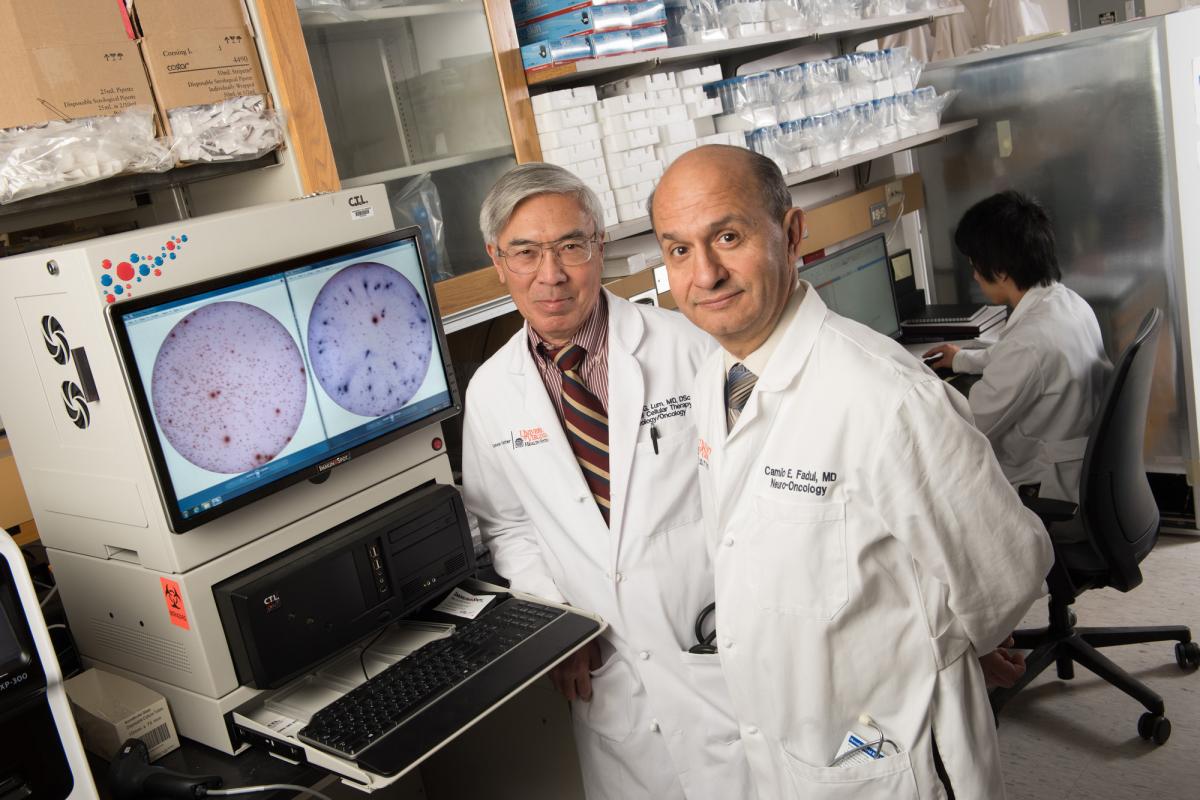The Battle Within: Using the Immune System to Fight Brain Cancer
Cancer-fighting immunotherapy offers new hope for patients battling glioblastoma, a deadly form of brain cancer. A clinical trial is underway at UVA to test a novel treatment that uses the patient’s own immune system to recognize, target, and kill glioblastoma cells. This approach already has shown promise for other diseases, including breast, prostate, and pancreatic cancers, and non-Hodgkin’s lymphoma.
Led by Camilo Fadul, MD, and Lawrence Lum, MD, DSC, Phase 1 of the clinical trial was made possible through seed funding awarded in 2017 by the UVA Brain Institute. UVA is the only institution in the world to test this new strategy to fight glioblastoma.
An Aggressive Cancer
The most common type of brain cancer in adults, glioblastoma is incurable. The disease, featured more prominently in national headlines since Senator John McCain was diagnosed in July 2017, kills most patients within five years of diagnosis. The standard of care is surgery, followed by radiation and chemotherapy—but these treatments have limitations. The tumor can’t be completely removed with surgery because the tumor “usually intertwines like fingers in the brain,” Fadul explains. Radiation comes with the risk of toxicity, and chemotherapy drugs do not always cross over into the brain.
“There is an urgent need for better treatments,” Fadul says. “The idea of immunotherapy is promising because of the success it has shown in improving outcomes for other cancers.”
Creating an Army of T Cells
Cancer cells are stealthy, allowing them to go undetected by the body’s immune system.
Immunotherapy can change that. The process starts with the removal of the patient’s T cells following surgery. The cells are put into a culture for 14 days, where they multiply to around 100 billion.
Lum’s unique method involves the creation of “bi-specific antibodies” that serve two purposes: to activate the T cells and to target the tumor cells. Once the T cells have been groomed and coated with this product, they are infused back into the patient, where they go on the hunt for the glioblastoma cells. Patients will undergo radiation and chemotherapy after this process.
“We start out with a small army of cells and amplify their numbers,” Lum says. “Then we turn our army into specific killers that target the glioblastoma tumors. This will be a supplemental boost to the immune system to help it eliminate residual tumor that can’t be removed with surgery. When the targeted T cells encounter the tumor and start killing it, the release of cancer proteins should attract cells from the patient’s own immune system to the site. They can be trained to recognize and kill the tumor."
This technique of infusing patients with targeted T cells has been shown to create immunity that lasts several years. UVA’s new clinical trial will help determine the safest dose of the immunotherapy and observe its effects on the tumor.
“Can we make the tumor be quiet and go away for months to years?” asks Lum, who is exploring ways to use this treatment for other diseases, including diabetes. “That would be a home run, if we could do this for even one out of 10 or one out of 20 patients. But it’s a long road, and we won’t know what’s possible until we try.”

